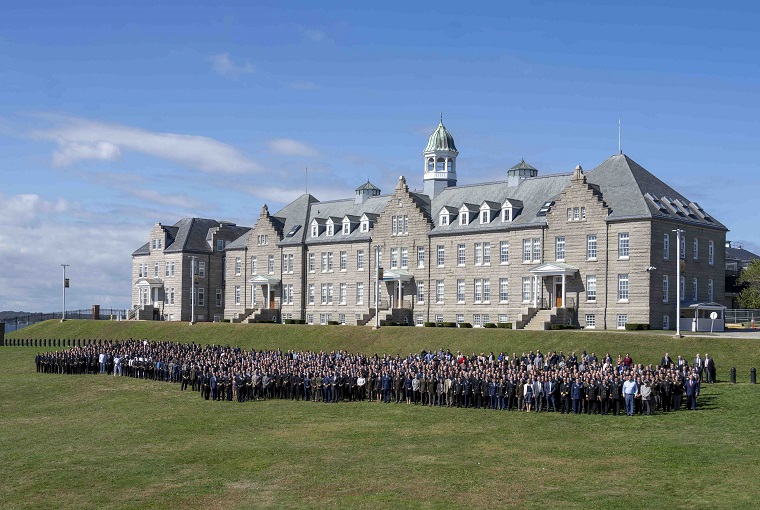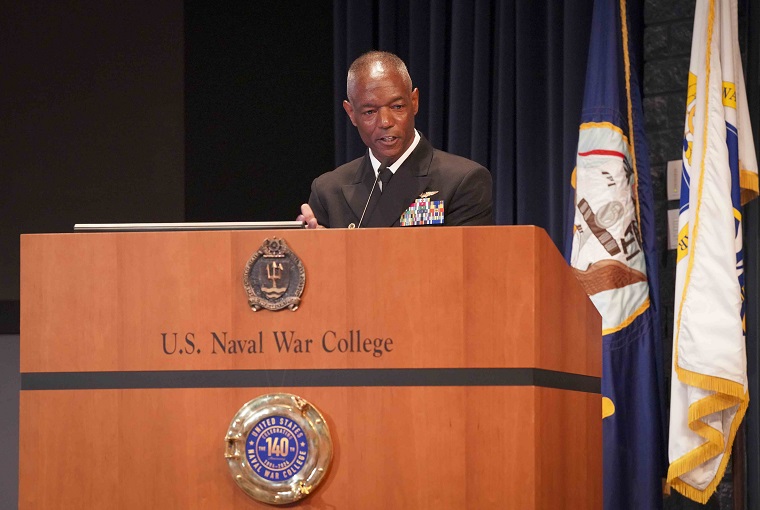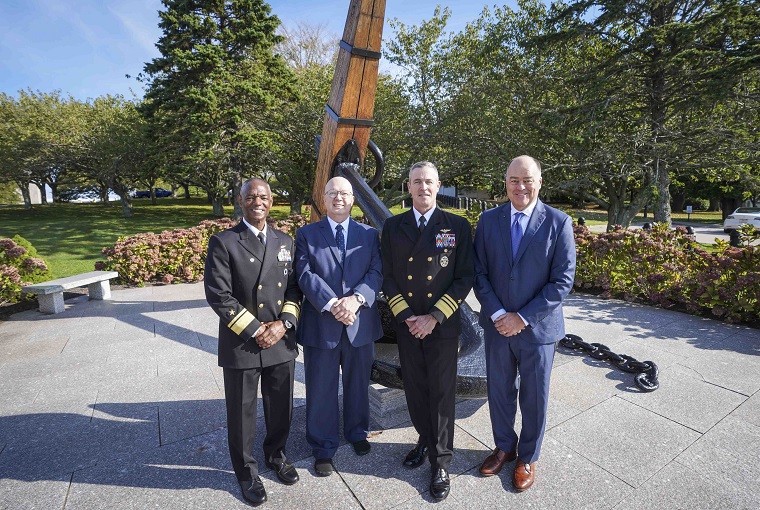U.S. Naval War College Celebrates 140th Anniversary with Ceremony Honoring Legacy and Future

NEWPORT, R.I. - The U.S. Naval War College (NWC) marked its 140th anniversary with an official ceremony paying tribute to the institution’s historic contributions to professional military education and U.S. strategic decision making, onboard Naval Station Newport, Oct. 4.
The significant milestone event drew more than 300 in-person and virtual attendees, including past NWC presidents, alumni, international guests, and members of the academic community to honor the legacy of the world’s first institution dedicated to the development of naval strategy and the conduct of professional military education.

“Since 1884, this institution has championed the study of preventing, fighting, and decisively winning wars. We will continue to be the Navy's Center of Excellence to produce the strategic-minded leaders, cutting-edge research, and enduring relationships with allies and partners necessary to anticipate and ready our nation for whatever challenges the next 140 years may bring,” said Rear Adm. Darryl L. Walker, president of NWC.
Distinguished visitors included Sen. Jack Reed, D-R.I., Sen. Sheldon Whitehouse, D-R.I., Rep. Gabe Amo, D-R.I., and Newport Mayor Xay Khamsyvoravong. Past NWC presidents in attendance included ret. Vice Adm. John N. Christenson, Vice Adm. Peter A. Garvin and ret. Rear Adm. Jeff Harley.
The anniversary celebration began with welcoming remarks by Prof. John Jackson, NWC College of Distance Education, who emphasized the uniqueness of the college’s current role within the Navy and its major impact on maritime development and operations for nearly a century and a half.
“NWC is a very special place that has played a unique role in developing patriotic men and women who have led the nation's maritime forces in times of peace and in times of war,” Jackson expressed. “From the age of sail to the age of cyberspace, the college has been at the forefront of American and allied sea power, working together to defend all that we hold dear.”
Reed and Whitehouse read a proclamation thanking the college for the work it has done and continues to do to preserve and safeguard liberties and freedoms and to promote and protect democracy in the U.S. and across the globe.
Reed explained that although today’s global challenges have changed profoundly, “there is at least one constant: the dedicated faculty and students here.”
Whitehouse agreed stating, “What makes the Naval War College important is not just the history and tradition but the way it attends to the future.”
Amo remarked that NWC has been a “quintessential good neighbor for the Aquidneck Island community” over the years. “In so many ways, the Naval War College has anchored our community since its very first days.”
In recognition of the college’s milestone and to underscore its importance to the Newport community, Khamsyvoravong declared October 4, 2024 to be “Naval War College Day” and called upon all Newport citizens to honor the college’s contributions and support service members throughout the year.
Also read at the ceremony were messages from Secretary of the Navy Carlos Del Toro and Chief of Naval Operations Adm. Lisa Franchetti, both graduates of NWC.
“For nearly a century and a half, the Naval War College has been a cornerstone of our nation’s naval power, shaping the minds of generations of naval and other military leaders and contributing significantly to our national security,” wrote Del Toro. “As we look to the future, I am confident that the Naval War College will continue to be a driving force in shaping our nation’s maritime strategy.”
Franchetti echoed the secretary’s trust in NWC’s future writing, “Today’s security challenges may be more volatile, uncertain, complex and ambiguous than when the Naval War College was founded, but the excellence of the college and its value to our Navy are unchanged.”
Since the college’s founding in 1884 by Rear Adm. Stephen B. Luce, NWC has been on the forefront of professional military education, defining the future Navy and informing decision making at the highest levels of government, both in the United States and around the globe.

Over the 140 years of its existence, NWC has progressed through various phases of growth and adaptation, emphasizing the continuous evolution of its curriculum and role in preparing military leaders for emerging challenges. These curriculum changes were significant as they reflected the evolving needs of the U.S. Navy and broader military and had lasting effects on the development of naval strategy and leadership.
The repurposing of the Newport Poor House on Coasters Harbor Island in 1884 to establish the college marks the first milestone of the institution under Luce, who envisioned the institution as a place where officers could study the science of war, integrating practical experience and stimulating intellectual development. He introduced a groundbreaking curriculum focused on naval strategy and tactics, using historical case studies to teach officers to think beyond individual battles and consider broader strategic objectives.
Despite significant challenges, the college quickly became a focal point for the study and strategic analysis of naval warfare with significant impact on global naval doctrines and leading to U.S. naval dominance throughout the 20th and 21st centuries.
Contributions from the college’s second president, Capt. Alfred Thayer Mahan, also left an indelible mark on the Navy’s history. Like Luce, Mahan placed great value on utilizing historiography to develop modern naval strategy, stressing the importance of a strong navy, strategic naval bases and control of critical maritime trade routes.
Mahan's seminal work, “The Influence of Sea Power upon History, 1660–1783,” argued that control of the seas was key to national dominance and prosperity and that nations with superior sea power had greater economic and military leverage on the global stage. Mahan’s revolutionary theories soon became the hallmark of the college’s curriculum, heavily influencing naval strategies worldwide for generations to come.
The inter-war years of 1918-1941 are often called the “Golden Era of the Naval War College.” During this period, Rear Adm. William S. Sims (1919 to 1922) instituted timely and relevant changes to the college. Drawing from lessons learned in World War I, Sims updated the existing curriculum, emphasizing modern naval strategy, the importance of technology and practical education. Under his leadership, students analyzed convoy systems, anti-submarine warfare and fleet coordination as well as emerging technologies like communications and naval gunnery.
Sims also greatly expanded wargaming as a core part of the curriculum to test strategic theories in simulated battle conditions, honing officers' decision-making and tactical skills in a risk-free environment. The innovative changes during his administration not only enhanced naval education but also laid the groundwork for strategic concepts that would later guide U.S. naval operations during World War II.
Following his heroic leadership during World War II, Adm. Raymond Spruance returned to his alma mater as president in 1946. He sought to revitalize the college by placing greater emphasis on strategic theory, operational planning and analysis. He favored a more academic approach, incorporating formal studies of history, strategy, and international relations into the curriculum, which reflected a shift toward a more scholarly examination of naval warfare.
Spruance also promoted the importance of joint operations and cooperation with other branches of the military, reflecting the growing need for integrated military strategies in the modern era.
After World War II, the college expanded the scope of its geopolitical and strategic studies, encouraging officers to think globally about the U.S. Navy's role in international relations and diplomacy. This expansion led to the introduction of the Naval Command College (NCC) in 1956, which provided senior officers from allied navies worldwide an opportunity to study, exchange ideas and build relationships in a professional military educational setting. NCC served as a strategic tool during the Cold War to promote U.S. maritime interests, strengthen international alliances and counterbalance Soviet influence across the globe.
Led by Adm. Stansfield Turner, the “Turner Revolution” of the 1970s was a pivotal period marked by considerable changes that enhanced the college's educational framework and strategic relevance. Turner significantly revamped the college’s curriculum to address the complexities of modern warfare and the geopolitical landscape of the time (i.e. the Cold War). The emphasis was on strategy and national security to ensure that students understood not only military tactics but also the broader implications of their decisions in a global context.
Utilizing an interdisciplinary approach, Turner integrated insights from political science, economics and history, fostering a more holistic understanding of the factors influencing military operations and international relations.
Turner’s establishment of a permanent civilian faculty in 1972 signaled another milestone for the college. The new faculty introduced greater academic rigor and diverse perspectives, helping to bridge the gap between military practice and academic theory and enriching military education. The college also expanded its international programs during this period, attracting more officers from allied nations. The expansion fostered stronger relationships with foreign navies, ultimately enhancing U.S. leadership in global naval strategy.
The “Turner Revolution” also introduced innovative teaching methods, favoring seminars, electronic wargames and case studies that fostered critical thinking and discussion. Turner’s leadership transformed NWC into an even more relevant and influential institution in military education and his influence is still evident in the college’s mission and approach to this day.
NWC continued to evolve and grow in the 1980s and 1990s with the Goldwater-Nichols Act, leading to joint education reforms and an emphasis on cross-service learning. The college also gained accreditation from the New England Association of Schools and Colleges to award master’s degrees in 1991, which led to the need for a significant growth in college administration with the addition of provosts and deans.
Now in the 21st century, NWC continues to teach tomorrow’s naval leaders, joint and interagency professionals, and international partners the enduring principles of war and strategy. With the changing character of war, however, conflicts are increasingly more volatile, uncertain, complex and ambiguous, demanding a dynamic, continuously adaptive curriculum.
To maintain relevancy, the college recently launched several initiatives aimed at adapting to contemporary challenges while maintaining its core mission of research, education, and strategic partnerships.
The 2024-25 academic year saw the introduction of a new course, Perspectives on Modern War (PMW), designed to help students synthesize information across all core and elective courses, meaningfully connecting their academic and operational experiences with current and emerging security issues. The course exemplifies the strategic direction of the college in developing programming that addresses the needs of the joint warfighter in the near-future strategic environment.
The college also continues to lead the military services in the use of wargames and simulations. Acute focus has also been placed on pedagogical wargaming, which has been incorporated across all seminars using exercise style games that feature historical and fictional scenarios to enrich student learning.
NWC is also at the forefront of solidifying relationships with America’s maritime partners via the International Seapower Symposium (ISS) series and the Regional Alumni Symposia program. ISS-2024 brought together 174 delegates from 91 countries, including 75 international heads of navies, to discuss global maritime challenges and develop cogent solutions.
The latest in the NWC Regional Alumni Symposium series, the Indo-American War College Conference, held at NWC-Goa, India, convened more than 120 participants from 17 countries, including seven of the last 11 Indian Chiefs of the Naval Staff. These academic conferences reinforce the importance of lifelong, continuous learning and enduring relationships, intellectual exchange, and collaboration between international maritime partners.
“As faculty, staff, and students at the Naval War College, we are all proud to be part of the legacy and continuing story of this distinguished institution,” stated John B. Hattendorf, Ernest J. King Professor Emeritus of Maritime History at NWC. “For what happened then still matters now.”
Established in 1884, NWC is the oldest institution of its kind in the world. The college delivers excellence in education, research, and outreach, informing today’s decision makers, educating tomorrow’s leaders, and engaging partners and allies on all matters of naval power in order to preserve the peace, respond in crisis, and win decisively in war.
